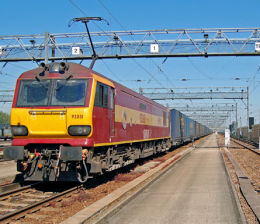Posted 14th December 2007
Chunnel freight poised for haulage boom

Rail freight company EWS is launching new services to the continent through the Channel Tunnel following years of declining traffic levels to mainland Europe.
From early in 2008, incoming and outgoing intermodal freight commodities will start moving through the tunnel again, to and from destinations in Germany, Belgium and Italy.
Trains will be hauled through the tunnel by Class 92 dual-voltage electric locomotives, while Class 66 and Class 60 diesel locos will be used on conventional rail routes throughout the UK for the time being.
The news follows a recent announcement by Channel Tunnel owners Eurotunnel on a whole new charging framework which effectively means lower rates and the opportunity for any freight train to use the tunnel as long as it satisfies safety requirements.
But EWS has
also revealed that it is having talks with the current owners of High
Speed 1, the new rail link from east London to the Channel Tunnel,
launched last month,
with a view to running freight trains on the route.
A number of technical issues have to be overcome, including cab signalling, but it is hoped to start trials using electric locos on HS1 in the fourth quarter of 2008 and into 2009. Freight access charges will also be discussed.
Class 92s would have to be used because of the severe gradients and freight traffic would have to run at night.
Graham Smith, EWS planning director, said: “There is an excellent opportunity for moving freight into and out of the east London area. We are convinced that we can take advantage of that in 2009.”
News that EWS is preparing to start building up tonnages to and from the continent to get back to 1998 levels follows the announcement by Eurotunnel of a new ‘open access’ regime.
A series of problems had hit freight using the Chunnel between 1999 and 2002. Asylum seekers practically ‘destroyed’ Channel Tunnel freight but in 2003 servicing and pricing issues in mainland Europe effected recovery.
In 2006 there were further problems with international costs increasing due to the ending of the minimum usage charge.
But now EWS is set to compete with short-haul sea freight and claims that it will be keeping at least 1,000 lorries off the UK motorways.
During 2008, services will be rolled out to connect with freight hubs in Belgium, Germany, Italy, France, Spain and Switzerland and with key UK hubs such as Daventry in the Midlands, Trafford Park in the North West and Mossend in Scotland.
The new services will be handled from January by EWS division Euro Cargo Rail, which will bring in sub-contracted help when needed.
The plan includes:
• Brussels to Daventry three times a week from January – time taken: 24 hours.
• Duisburg to Manchester (Trafford Park) six times a week from February 2008 – time taken: 30 hours.
• Milan to Manchester five times a week from March 2008.
David Kerr, commercial director for EWS, said: “In two years our objective is to get back to the record three million tonnes of goods moved in 1998.
“Our target is to move six million tonnes over next five years.”
The company is planning to increase train movements to the continent to 35-50 trips a week. Goods shifted will range from foodstuffs to furniture, textiles and chemicals.
Rolling stock implications of the new services means that EWS will be leasing 100 new intermodal wagons to work alongside existing assets in 2008, while 20 new electric locomotives are being built by Bombardier for use by Euro Cargo Rail.
The company is coy about cost savings to customers using the services but expects them to be in the region of five to 10 per cent. “We will be more competitive than existing options,” said David Kerr.
